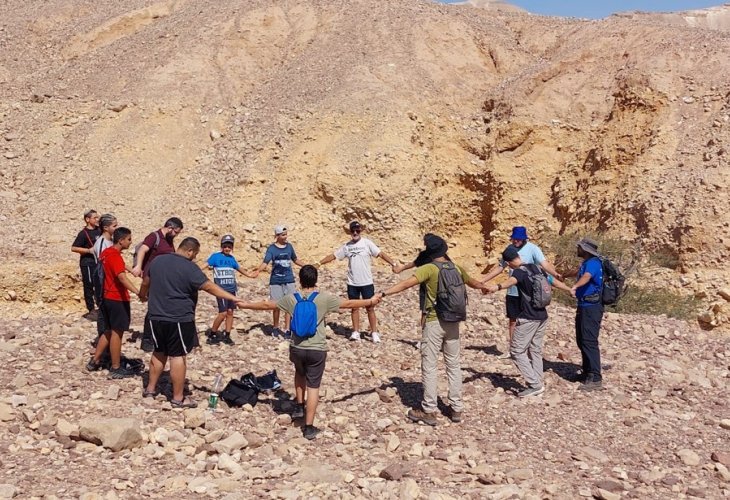Assistant Principal in Sderot: "The Children Just Want to Go Home and Study Normally"
Around 100 students from the AMIT religious school in Sderot, managed by Assistant Principal Ilan Abecassis, are currently in Eilat, struggling to maintain a learning routine. "We provide them with relaxation and diversion programs, but actual studying is tough to accomplish," he shares. "The students want just one thing: to return home."
 With students, during relaxation and release activities
With students, during relaxation and release activities"It's been a month since the war broke out, and it doesn't seem like any routine is going to form here," says Ilan Abecassis, the assistant principal of AMIT Educational Center in Sderot, currently in Eilat with his students and most other city residents. He notes this with pain, but also with understanding and even acceptance. "You can't expect students to be in a learning state after all they've been through," he explains.
According to him, around 100 students from the school, from grades 7 to 12, are currently in the city, each with their own needs and challenges. "In the first week, we didn't even try to gather them," he recounts, "I just sat with the staff to map out and understand where each child was, get acquainted with their needs, find out where they spent Shabbat, what they experienced, and whether they require special assistance. But starting from the second week, we are trying to establish a learning routine here, and as I mentioned, it's more complicated than one can imagine. I keep telling my staff that we can't learn from anyone else, because no one has ever dealt with a situation like this. We don't have any experience in this matter ourselves, and we operate purely based on intuition and internal understanding, hoping to be good emissaries."

Learning from Trauma
When Abecassis talks about his students, he emphasizes the considerable distress: "For over 20 years, we've been dealing with Qassams in Sderot. Many children in the city have trauma and PTSD symptoms even before the current war. I've encountered situations in the past when a classroom door slammed, and the children jumped, or a plane passed overhead, reminding them of the missile interception sound, and the children ran to a shelter. These are children who grew up with Qassams, and when you add everything that happened in the current war, especially the terrorists who invaded Sderot, you can understand how dire their situation is."
When were the children evacuated from the city?
"Most children were evacuated from the city the day after Simchat Torah, during a mass departure, but regrettably saw horrifying scenes along the way that even we adults couldn't believe we'd witness. It's no wonder that even now, a month later, there are children in my school – those in grades 7 to 12 – who remain in hotels and refuse to engage in any activities or learning. They just want the warmth of their parents, insisting on being near them. Conversely, some children experience the complete opposite, and after being holed up in bomb shelters for extended periods, they just want to burst out and see the world."
Moreover, being in Eilat presents a dramatic change for the children from all aspects. "A child at any age needs their familiar routine, yet here there is no resemblance to their regular life. The children lack their personal space; they sleep with their parents in a room, their mother is not doing the laundry or meals, as everything is handled by the hotel. Parents also do not go to work as they were accustomed to. The whole family structure disintegrates. Naturally, the child struggles to comprehend their role and responsibilities and, of course, finds it hard to grasp that sooner or later, they will have to return to studies as they are completely distant from it."
Refreshing with a "Journey in Israel"
Despite everything, Alon mentions that they decided to resume the learning routine under any circumstance, but gradually. "In the second week, we scheduled meetings with the kids, but solely for field activities and diversions. We initiated these activities with the help of the 'Journey in Israel' organization, which provided fascinating activities in the area, deeply refreshing the kids, including games and hiking trails. This was most essential for the body and soul, and currently, we aim to gradually return to an academic routine—build a structured lesson schedule and let the children meet with the staff for about two and a half to three hours daily. We received a school building in Eilat for this purpose, where we gather to learn as much as we can and attempt to return to normalcy."

Let's be honest: Do you truly believe you can conduct studies in such a situation?
"Real studies, I don't think we can conduct in the near future, but our goal is mainly to integrate the children into a framework, and in this mission, we do succeed. Indeed, not all children come to all classes, and the teachers aren't necessarily their regular teachers, as they are spread out in various locations. But we see closely how valuable and contributing each class is. Furthermore, we conduct a variety of lessons also via Zoom, where we can almost fully assemble the class with the usual staff, thus providing a professional educational response."
Must the students participate in the classes?
"Of course, you can't demand their participation, and this is indeed our biggest challenge in this period—getting the kids away from screens or their hotel room to come and learn, especially since waking up in the morning is very challenging for them, as they go to bed very late. You have to come up with many creative solutions and ideas to allow the lesson to occur."
Did anyone discuss a return date to the city with you?
"There's been no talk about it, and I don't think it will happen shortly. For the children, I'm sure it's destructive because I hear from everyone how much they want to return to their home and bed, to all the things they left behind. Moreover, there's also the ideological issue, because I truly believe that each day we don't return to Sderot and it continues to be a ghost town, it's another victory for Hamas."
Nevertheless, he also has something optimistic to note in conclusion: "Throughout the Shabbatot we've been here, we've held 'Kabbalat Shabbat' with many participants, and it was moving to see how all the students who are spread all over during the week gather together connected to song and prayer. The feeling is suddenly there are no disagreements among the people, and everyone is like one family. At times like this, the thought goes through my mind that maybe during this period, we are not really learning in a physical sense, but there is such an important lesson for life here, and hopefully, this lesson will accompany us further."

